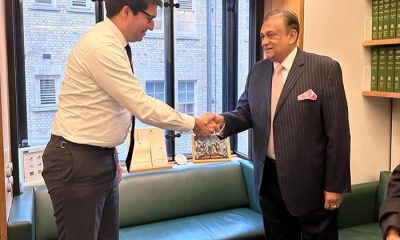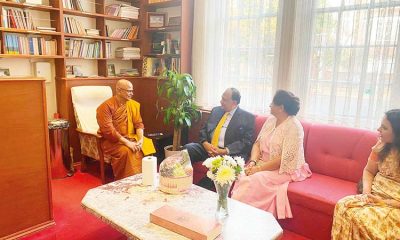Editorial
Lean and Mean approach needed for our overseas missions

In an unusual cartoon illustrated spread taking up more than half its front page last Tuesday, the Daily Mirror splashed the news of the impending appointment of Mr. Rohitha Bogollagama, a former foreign minister, as Sri Lanka’s new High Commissioner to the United Kingdom. He replaces Ms. Saroja Sirisena, a career diplomat widely regarded as having done a good job in an overseas mission considered among the more important maintained by post-Independent Ceylon/Sri Lanka. The headline of that lead story blared: “Sri Lanka’s Foreign Service: A Den of Political Appointees.” The accompanying cartoon showed Bogollagama, with a pottaniya slung on a stick across his shoulder, astride an aircraft with a globe as the background.
That news spread undoubtedly resonated in the minds and heart of readers, disgusted by the way in which this small country, now in the grips of an unprecedented economic crisis, has over the decades lavished scarce resources on its many overseas missions – high commissions in Commonwealth countries, embassies and consulates in others.
We squander foreign exchange resources we can ill afford on often unnecessary overseas missions that any simple cost: benefit analysis will amply demonstrate makes no sense whatever. And on top of all that, politicians widely disliked by the polity that created them for many good reasons, are pampered at such missions with ambassadorial appointments with lavish perquisites. Many of them have preferred these to high political, including cabinet office, back in the home country. Apart from that, political panjandrums have frequently had their progeny, sometimes spouses and other favorites appointed to Sri Lanka’s overseas missions at the cost of the professional diplomatic service.
Bogollagama has at different times in his political career belonged to the UNP, the SLFP, UPFA and whatever, always benefiting personally from such connections. Apart from his stints in the cabinet, he served as Governor of the Eastern Province and headed several state-owned enterprises. His past extravagances as foreign minister had time and again captured media attention. The Daily Mirror report harks back to some of them including a trip to Brazil which had cost the state an estimated five million rupees (at then money value) and included a vacation in a Rio de Janeiro beach resort.
Another mentions a New York visit by him to join the presidential delegation to a session of the UN General Assembly where he was booked at the luxurious Ritz Carlton hotel. This report goes on to say that the minister’s public relations and private security officers assigned separate rooms had been asked to bunk together to make one room available for the minister’s daughter and her husband who worked in the Sri Lanka’s Washington mission; the report is unclear on who worked for the mission – daughter or husband.
Who was responsible for the Bogollagama appointment is not known. It can be expected that in an appointment as important, and as coveted as this, the president would have a hand. But right now there are two power centers in the government – the presidency and the Rajapaksas’ Sri Lanka Podu Jana Pakshaya (SLPP) where Basil Rajapaksa is widely regarded as the mover and shaker.
The Daily Mirror report said that Bogollagama was handpicked to engage with the Tamil diaspora in the UK where there is a sizable Sri Lankan population. There is no previously demonstrated competence on his part of specific skills in this area. President Wickremesinghe is deeply committed to fast tracking the mending of communal fences but the country is already past the Feb. 4, 2023 deadline he set for himself in this regard.
Political leaders preferring diplomatic assignments overseas to even cabinet appointments at home is not a new development in this country. Older readers will remember that leaders of the stature of Sir Oliver Goonatillake, who late became Governor-General of this country, went to London as Ceylon’s High Commissioner in the post-Independence period.
At that time there were others like Sir Claude Corea, Sir Senerath Gunawardena, Sir Susantha de Fonseka and Labour Party founder-leader A.E. Goonasinha who accepted diplomatic assignments. Most recently, Mr. Mahinda Samarasinghe quit his cabinet ministry to go to Washington as ambassador. President Premadasa is once reputed to have told a politician who preferred an overseas assignment to a junior ministry: “Mama thamuseta ASP kamak denakota, thamusey Constable padaviyak illanwa.” That worthy having served as Deputy High Commissioner in Canada had acquired a taste for diplomatic life.
At various times, notably during Foreign Minister Lakshman Kadirgmar’s tenure as foreign minister, we have heard of a ‘right balance’ between political and professional appointments to the higher levels of the diplomatic service. Discovering the present position in this regard will be a useful exercise. We are not saying that appointments to the country’s overseas missions of persons without foreign service backgrounds is always a bad thing. Ambassador Shirley Amarasinghe, a member of the then elite Ceylon Civil Service shone at the United Nations and was desired globally to chair the UN Law Of The Sea Conference even when then President J.R. Jayewardene refused to let him continue as this country’s Ambassador to the UN. Neville Kanakaratne’s is another name that springs to mind in that regard.
All things said, Sri Lanka surely has more foreign missions than the country can afford. Three of them were closed down in 2021 and there are many more that merit closure. Why we have a mission in the Seychelles is beyond all understanding. Given our current financial predicament, there is no doubt that a seriously ‘lean and mean’ approach is needed on the number for overseas missions we run and how they are staffed. What prevails now is an abomination.
Editorial
Ensure safety of COPF Chairman

Saturday 8th June, 2024
It was with shock and dismay that we received the news about death threats to COPF (Committee on Public Finance) Chairman Dr. Harsha de Silva over the ongoing parliamentary probe into the on-arrival visa scam. Dr. de Silva yesterday told Speaker Mahinda Yapa Abeywardena, in Parliament, that he was facing death threats and intimidation, and it was incumbent upon Parliament to ensure his safety. He stopped short of naming names, but revealed that some ruling party MPs were among those who had ganged up against him. The Speaker only said there had been no complaint, and he would look into the matter.
The SLPP-UNP government has been doing everything in its power to have all parliamentary committees under its thumb. The COPE (Committee on Public Enterprises), which once helped restore public faith in the legislature by exposing state sector corruption, has now become a mere appendage of the incumbent regime, thanks to the appointment of SLPP MP Rohitha Abeygunawardena as its Chairman. The SLPP-UNP combine also tried to oust COPF Chairman Dr. de Silva, but in vain. However, it knows more than one way to shoe a horse.
The COPF, under Dr. de Silva’s chairmanship, has been a thorn in the side of the government, which is struggling to cover up numerous corrupt deals. Dr. de Silva yesterday told Parliament that he found it extremely difficult to function as the COPF head due to severe resource constraints his committee was facing; he himself had to pay the salaries of some of his staff members besides burning the midnight oil.
The sheer workload he had to cope with as the COPF chief had taken its toll on his health, he said, informing the Speaker that he was at the end of his tether, and at times thought of resigning from the COPF. This is exactly what the government wants him to do; resource squeezes and threats are aimed at making him quit.
On 26 May, Dr. de Silva revealed, in an ‘X’ post, that the COPF had uncovered some vital information about the visa scam and it would reveal everything after its final meeting on the issue; the COPF was committed to exposing the truth behind the controversial tender, he added. In an editorial comment on 27 May, we warned him.
While thanking him for his bold stand, we pointed out that by making such a statement, he had thrown caution to the wind, and become a marked target, with the government making an all-out effort to delay the COPF investigation lest the truth should come out much to the detriment of its interests in this election year. Unfortunately, what was feared has come about; Dr. de Silva is complaining of death threats and government moves to strangulate the COPF financially to derail its investigations.
Dr. de Silva’s predicament exemplifies the fate that befalls the few good men and women in Parliament. It is hoped that all those who seek an end to the state sector corruption will rally behind Dr. de Silva, and bring pressure to bear on the government to ensure his safety. Let Dr. de Silva be urged to reveal the names of those who have issued threats, veiled or otherwise, to him and are trying to scuttle the COPF probes.
Editorial
Dead man walking!

Friday 7th June, 2024
The SLPP-UNP government is going hell for leather to make bad laws as if there were no tomorrow. It is abusing its parliamentary majority, which has been retained with the help of some crossovers, for that purpose. The Opposition, the media and trade unions are up in arms, and understandably so. The incumbent regime is a dead man walking; it is so desperate that it is capable of anything. Hence the need for it to be restrained.
The Electricity (Amendment) Bill (EAB) plunged Parliament into turmoil yesterday, but the government secured its passage. The Supreme Court (SC) determined the entire EAB inconsistent with the Constitution and recommended changes thereto. After unveiling the Bill, sometime ago, Minister of Power and Energy Kanchana Wijesekera hailed it as an excellent piece of legislation aimed at straightening up the power sector to serve the public interest better.
The SC determination left him with egg on his face. He reminded us of the proverbial curate who, while eating a stale egg, assured his host, a Bishop, that parts of it were excellent. Wijesekera’s egg, as it were, made Parliament stink yesterday, but he sought to please his masters by praising it as a silver bullet.
EAB should have been discarded and a new one drafted in consultation with all stakeholders. But the government is apparently driven by an ulterior motive; its aim is not to serve Sri Lanka’s interests but to look after those of some moneybags.
It is not uncommon for Bills to contain some flaws, which are rectified either before or during the committee stage. But there is something terribly wrong with draft Bills that are full of sections inconsistent with the Constitution. The drafters of EAB have demonstrated their sheer ignorance of the supreme law, and that they are not equal to the task of drafting Bills. If they had read the Constitution at least perfunctorily, they would not have drafted such a bad law.
Ignorant and incompetent, they do not deserve to be paid with public funds and must be sent back to law school. They must be summoned before Parliament and questioned on their serious lapses, which have caused public faith in the national legislature to diminish.
Curiously, the MPs who demand that judges, doctors, Central Bankers, and other public officials be summoned before Parliament have taken badly drafted Bills for granted. The power sector trade unions yesterday alleged that EAB was of Indian origin and geared towards furthering the interests of Adani Group at the expense of Sri Lanka.
Most critics of EAB are agreeable in principle to the need for power sector reforms; the Ceylon Electricity Board should be given a radical shake-up, and transformed into a modern organisation capable of providing a better service at a lower cost. They only asked the government to tread cautiously, consulting all stakeholders and taking action to ensure that the country’s interests prevailed over everything else. But the government was in a mighty hurry to steamroller the Bill through Parliament, making the Opposition ask whether it was doing so at the behest of some external forces involved in controversial power generation deals here.
What is passed by the current Parliament can be either amended or abolished by a future parliament in a constitutionally prescribed manner. But that does not mean that a government is free to pass bad laws, making the country enter into long-term agreements with powerful nations and their investors. It looks as if the SLPP-UNP regime did not care two hoots about the consequences of its actions.
Editorial
Modi Magic on the wane

Thursday 6th June, 2024
The outcome of India’s parliamentary election (2024) has led to a ‘perspective ambiguity’. Prime Minister Narendra Modi lost no time in declaring victory for the BJP-led NDA alliance, which secured 293 seats in the 543-member Parliament, but he must be a worried man. The BJP is short of 32 seats to form a government under its own steam; it has lost 63 seats or about 20% of its parliamentary strength. It had 303 seats in the previous Parliament, and that number has dropped to 240.
Modi has become the second Indian Prime Minister to win a third term. The first PM to do so was Jawaharlal Nehru. But Nehru won an outright majority in Parliament in 1962; Modi has had to depend on smaller parties in his alliance to retain his hold on power. Modi must be reeling from a sharp drop in his victory margin in his own constituency, Varanasi; it has decreased to 152,000 from 480,000 in 2019 whereas Modi’s bete noire, Rahul Gandhi, won Raebareli by a staggering 390,000 votes.
Modi, who reigned supreme with 303 seats in the previous Parliament, is now dependent on parties such as Nitish Kumar’s JD-U and Chandrababu Naidu’s TDP to form a government. He has had to lead an alliance of strange bedfellows. Both Kumar and Naidu were bitter critics of Modi. Kumar helped form the oppositional alliance, the INDIA bloc, before switching his allegiance to PM Modi. Naidu also closed ranks with the BJP in the run-up to the election. These politicians have been described as extremely ambitious and highly unpredictable, and whether Modi will be able to manage them and consolidate his grip on the NDA alliance remains to be seen. They will demand plum ministerial posts in return for their support. The TDP is said to be eyeing Transport and Health portfolios! That is the name of the game in coalition politics, where it is not uncommon for the tail to wag the dog, so to speak. These two political leaders are however not the only problem Modi will have to contend with. The next five years will feel like an eternity for PM Modi.
Nothing would have been more shocking for the BJP than its defeat in Uttar Pradesh’s Faizabad constituency, where the Ram Mandir has been built. Modi may have thought he would be able to win the Lok Sabha election hands down after the consecration of that temple, which became a centrepiece of the BJP’s election campaign. The BJP lost that seat to the Samajwadi Party! Modi must be disappointed that the Ram Mandir hype failed to trigger a massive wave of support for his party. This particular defeat signifies a massive setback for the BJP’s ethno-religious agenda.
Modi’s divisive election campaign failed to yield the desired result. The BJP’s failure to secure an outright majority could be attributed to a host of factors, some of them being the suppression of the Opposition, the arrogance of power, chronic unemployment, and the rising cost of living. The BJP also did not care to reimage itself in a positive light to attract the youth.
Modi will hereafter see the Congress-led INDIA bloc with 223 seats, in his rearview mirror. The Congress (99 seats) and its allies have eaten into the BJP support base considerably, but they have a long way to go before being able to capture power.
The bumpy ride ahead for the BJP-led coalition government to be formed may improve the INDIA bloc’s chances of bettering their electoral performance and turning the tables on the BJP and its allies in time to come. Modi will have a lot to worry about in his third term.
























